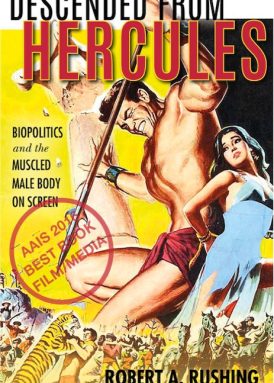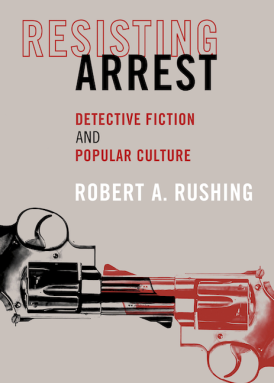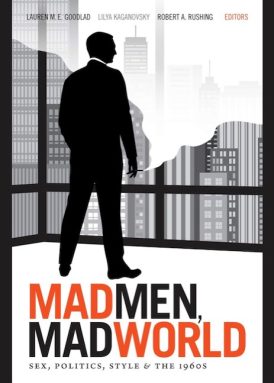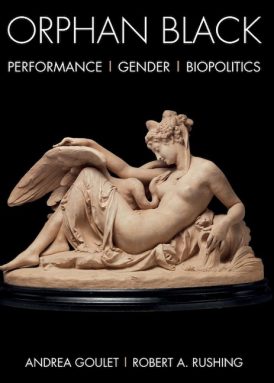
Robert Rushing
Professor
Professor Rushing teaches, researches and publishes on 20th- and 21st-century Italian literature, culture and film, including contemporary Italian fiction, film and television; critical and interpretive theory (especially gender and sexuality, psychoanalysis, biopolitics, and environmental humanities); popular culture, in both film and television (Mad Men and Orphan Black); comparative studies; and genre. He has published articles on topics ranging from Italo Calvino and Ovid to Mad Men and Antonioni, and he has a particular interest in popular genres, including Italian Westerns, science fiction (especially apocalyptic and post-apocalyptic cinema), commedia all’italiana and the “peplum” or the sword-and-sandals film. His most recent book, Descended from Hercules: Biopolitics and the Muscled Male Body on Screen, covers a century of peplum films from Cabiria to 300, and is the winner of the 2016 AAIS (American Association for Italian Studies) Film/Media book prize. Recent articles include work on cross-dressing in Italian silent cinema, the use of sound in peplum cinema, the importance of transnational movement in European detective fiction, and the “radical idealism” of plants in the work of Luigi Serafini and Leo Lionni.
His forthcoming book, Acoustic Afterlives: Calvino’s Transnational and Transmedial Resonance (Fordham University Press, Fall 2025), is on the transnational influence of Italo Calvino, arguing that Calvino’s influence is more powerfully felt outside of Italy than within, and more outside of literature than within (art, architecture, community engagement, painting, dance, music and much more). The book is particularly interested in Calvino’s influence on music and dance (Cerrone, Mezzacappa, Ramaswamy), and contends Calvino’s case can teach us about an acoustic model of influence and reception — namely resonance — that is much better than our usual theories of influence and reception.
Education
- Ph.D. in Italian Studies, UC Berkeley
- B.A. in Comparative Literature and Philosophy, UC Santa Cruz
Featured Works
Selected Publications
Articles
- “Radical Idealism: Serafini and Lionni’s Alternative Botanies,” in Thinking Italian Plants (Boston: Brill, forthcoming).
- “A Jazz Cosmicomics: Geometry, Perversion, Resonance,” California Italian Studies 12.1 (2023): 1–18 (https://escholarship.org/uc/item/32f5x484).
- “Contemporary Italian Detective Fiction: National, International, Transnational,” MLN 138.1 (2023): 165–88.
- “Eco-Horror: Human-Animal Encounters in the Italian Science Fiction Film,” in Italian Science-Fiction and the Environmental Humanities (Liverpool: Liverpool University Press, 2023): 111–26.
- “The Noise of War: Sound, Politics and Space in the Italian Peplum,” in Brill’s Companion to Ancient Greek and Roman Warfare on Film (Boston: Brill, 2023): 386–404.
- “Feet of Strength: The Sword-and-Sandals Film,” in Shoe Reels: The History and Philosophy of Footwear in Film (Edinburgh: Edinburgh University Press, 2021), 136–47.
- “‘Vestiti semimaschili’: Women Dressing as Men in Italian Silent Cinema,” gender/sexuality/italy 9 (2022): 81–100.
- “Calvino, Cerrone & the Catacoustic: an ‘Echo-logical’ Reading,” Italian Culture 39.2 (2021): 115–135.
- “Toxicity: Making the Toxic Visible in Italian Cinema,” The Italianist 40.2, special issue on ecomedia (2020): 244–55.
- “Italian Transnational Masculinity: Jeeg robot, Il ragazzo invisibile and Milzaman,” Journal of Italian Cinema and Media Studies 8.1 (January 2020): 43–60.
- “Planes, Trains, Automobiles, Bicycles, Spaceships and an Elephant: Images of Movement from Neorealism to the commedia all’italiana,” California Italian Studies 7.1 (2018) (https://escholarship.org/uc/item/2zt4d8px).
- “Contemporary Italian Science Fiction Film: the Future of Italy,” Luci e ombre: trimestrale di informazione cinematografica e culturale 4.2 (2016): 32–46.
- “Skin Flicks: Haptic Ideology in the Peplum Film,” Cinema Journal 56.1 (2016): 88–110.
- “The Weight of History: Immunity and the Nation in Italian Science Fiction Cinema,” Science Fiction Studies 42.2, 126 (2015): 339–52.
- “Nostalgia | Utopia | Spaghetti: Utopian and Anti-nostalgic Time in the Italian Western,” Studies in European Cinema 11.2 (2014): 79–91.
- “Sirens without Us: the Future after Humanity,” California Italian Studies 2.1 (2011) (escholarship.org/uc/item/0cc3b56b).
- “Blink: the Material Real in Caché, Mulholland Dr. and Dr. Who,” Postscript 29.3 (2010): 18–31.
- “‘Tutto è zuppa!’ Making the Superego Enjoy in Calvino’s Il cavaliere inesistente,” Romanic Review 101.3 (2010): 561–77.
- “De Sica’s The Children Are Watching Us: Neorealist Cinema and Sexual Difference,” Studies in European Cinema 6.2–3 (2009): 97–112.
- “Gentlemen Prefer Hercules: Desire | Identification | Beefcake,” Camera Obscura 23.3, 69 (2008): 158–91. Reprinted: in Visual Culture and Gender, vol. 1, ed. Annette Burfoot (London: Routledge, 2014).
- “Italo Svevo and Charlie Chaplin: Dramatic Irony and the Psychoanalytic Stance,” American Imago 63.2 (2006): 183–200.
- “‘What we desire, we shall never have’: Calvino, Žižek, Ovid,” Comparative Literature 58.1 (2006): 44–58.
- “Traveling Detectives: Verne’s “Logic of Arrest” and the Pleasures of (Avoiding) the Real,” Yale French Studies 108 (2005): 89–101.
- “From Monk to Monks: the End of Enjoyment in Eco’s The Name of the Rose,” Symposium 59.2 (2005): 116–28 (special issue on Italian detective fiction).
Honors and Awards
- LAS dean’s award for excellence in undergraduate teaching, University of Illinois (2018)
- Winner: best film/media book for Descended from Hercules(2016) from the American Association for Italian Studies (AAIS)
- Humanities council teaching excellence award, University of Illinois (2008)
- Nomination: Gradiva Award: best theory book for resisting arrest (2008) from the National Association for the Advancement of Psychoanalysis (NAAP)





